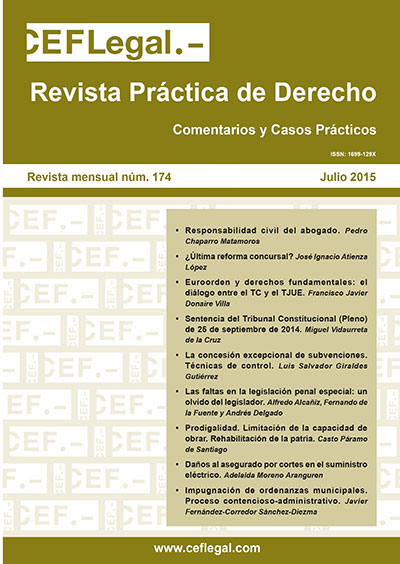El diálogo del Tribunal Constitucional español con el Tribunal de Justicia de la Unión Europea sobre la Euroorden y los derechos fundamentales: el asunto Melloni
DOI:
https://doi.org/10.51302/ceflegal.2015.11033Palabras clave:
diálogo judicial, Euroorden, derechos fundamentales, integración europeaResumen
El presente trabajo analiza el primer caso de diálogo judicial directo entablado por el Tribunal Constitucional español con el Tribunal de Justicia de la Unión Europea, en el denominado Asunto Melloni, con la formulación de tres cuestiones prejudiciales. Versan, respectivamente, sobre la interpretación y la validez de la Decisión Marco 2002/584/JAI, reguladora de la Orden Europea de Detención y Entrega, y sobre la interpretación del artículo 53 de la Carta de los Derechos Fundamentales. Se examinan las tres resoluciones que jalonan ese diálogo (el Auto del Tribunal Constitucional 86/2011, de 9 de junio, la Sentencia del Tribunal de Justicia –Gran Sala–, de 26 de febrero de 2013, y la Sentencia del Tribunal Constitucional 26/2014, de 13 de febrero).
Descargas
Citas
Alegre, S. y Leaf, M. [2004]: «Mutual Recognition in European Judicial Cooperation: A Step Too Far Too Soon? Case Study-The European Arrest Warrant», European Law Journal, vol. 10, n.º 2, págs. 200-217.
Cedeño Hernán, M. [2010]: «Vulneración indirecta de derechos fundamentales y juicio en ausencia en el ámbito de la orden europea de detención y entrega. A propósito de la Sentencia del Tribunal Constitucional 199/2009, de 28 de septiembre», Revista General de Derecho Europeo, n.º 20, págs. 1-15.
De la Quadra-Salcedo Janini, T. [2006]: «El encaje constitucional del nuevo sistema europeo de detención y entrega. Reflexiones tras la STC 177/2006, de 5 de junio», Revista Española de Derecho Constitucional, n.º 76, págs. 277-303.
Gordillo Pérez, L. I. [2009]: «El juez nacional y el juez europeo ante la Euroorden», en M. Revenga Sánchez (coord.), El Poder Judicial. VI Congreso de la Asociación de Constitucionalistas de España, Valencia: Tirant lo Blanch, págs. 755-790.
Iglesias Sánchez, S. [2010]: «La jurisprudencia constitucional comparada sobre la Orden Europea de Detención y Entrega, y la naturaleza jurídica de los actos del tercer pilar», Revista de Derecho Comunitario Europeo, n.º 35, 169-192.
Izurzun Montoro, F. y Mapelli Marchena, C. [2008]: «Orden Europea de Detención y Constitución. (Comentario a la Sentencia del Tribunal Constitucional 177/2006, de 5 de junio)», Noticias de la Unión Europea, n.º 282, págs. 15-29.
Komárek, J. [2007]: «European Constitutionalism and the European Arrest Warrant: In Search of the Limits of "Contrapunctual Principles"», Common Market Law Review, n.º 44, págs. 9-40.
Ladenburger, C. [2008]: «Police and Criminal Law in the Treaty of Lisbon. A New Dimension for the Community Method», European Constitutional Law Review, 4 (1), págs. 35-36.
Mitsilegas, V. [2007]: «The Constitutional Implications of Mutual Recognition in Criminal Matters in the EU», Common Market Law Review, 44, págs. 1.279-1.311.
Peers, S. [2004]: «Mutual Recognition and Criminal Law in the European Union: Has the Council got it wrong?», Common Market Law Review, 41, págs. 5-36.
Pollicino, O. [2008]: «European Arrest Warrant and Constitutional Principles of the Member States: a Case Law-Based Outline in the Attempt to Strike the Right Balance between Interacting Legal Systems», German Law Journal, vol. 09, n.º 10, págs. 1.313-1.355.
Pulido Quecedo, M. [2000]: «El Tribunal Constitucional como Tribunal Penal Internacional (Nota crítica de la STC 91/2000)», Repertorio Aranzadi del Tribunal Constitucional, n.º 1, págs. 1.760-1.762.
Revenga Sánchez, M. [2012]: «Rectificar preguntando. El Tribunal Constitucional acude al Tribunal de Justicia (ATC 86/2011, de 9 de junio)», Revista Española de Derecho Europeo, Civitas, n.º 41, págs. 139-150.
Rey Martínez, F. [2000]: «El problema constitucional de la extradición de condenados en contumacia. Comentario de la STC 91/2000 y concordantes», Teoría y Realidad Constitucional, n.º 5, págs. 289-335.
Rodríguez Horcajo, D. [2010]: «Derecho Europeo y Derecho nacional: dos piezas (a veces) difíciles de encajar. Comentario a la Sentencia del Tribunal Constitucional 199/2009, de 28 de septiembre», Revista General de Derecho Penal, n.º 14, págs. 1-17.
Torres Muro, I. [2013]: «La condena en ausencia: unas preguntas osadas (ATC 86/2001, de 9 de junio) y una respuesta contundente (Sentencia del Tribunal de Justicia de la Unión Europea de 26 de febrero de 2013)», Revista Española de Derecho Constitucional, 97, págs. 343-370.
– [2000]: «Enseñar al que ya sabe. Las extradiciones ante el Tribunal Constitucional (STC 91/2000)», Repertorio Aranzadi del Tribunal Constitucional, n.º 2, págs. 1.859-1.884.
Torres Pérez, A. [2012]: «Spanish Constitutional Court, Constitutional Dialogue on the European Arrest Warrant: The Spanish Constitutional Court Knocking on Luxembourg's Door, Spanish Constitutional Court, Order of 9 June 2011, ATC 86/2011», European Constitutional Law Review, vol. 8, Iss. 1, págs. 105-127.
– [2010]: «Euroorden y conflictos constitucionales: a propósito de la STC 199/2009, de 28 de septiembre de 2009», Revista Española de Derecho Europeo, Civitas, n.º 35, págs. 441-471.















